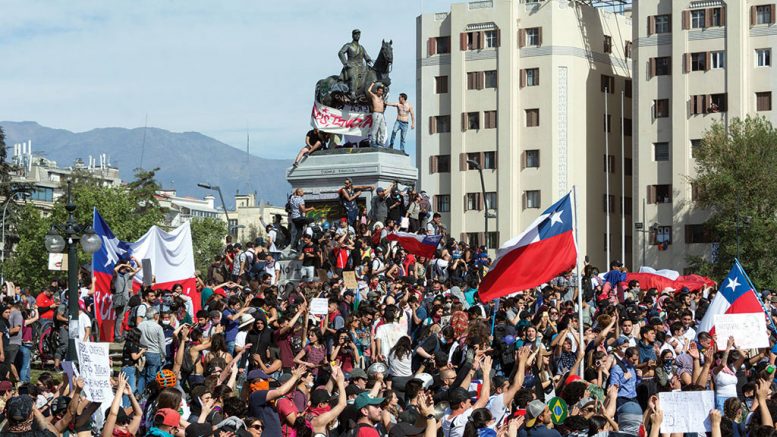The worst unrest in Chile in a generation threatens to overturn assumptions about one of South America’s most stable countries and the world’s leading copper producer.
All it took was a US4¢ rise in the peak hour fares on the Santiago metro on Oct. 6. But by Oct. 18, a week of mass fare-jumping by high school and university students had descended into widespread vandalism and pitched battles with riot police.
The scenes were apocalyptic, with dozens of metro stations and buses set alight, mobs looting supermarkets, and the headquarters of the country’s largest electricity company in flames.
With police apparently overwhelmed, Chile’s centre-right president Sebastian Pinera decreed a state of emergency, imposing a curfew and sending troops into Santiago for the first time since its return to democracy in 1990.
By then, however, it was too late. Tens of thousands of Chileans had taken to the streets, banging saucepans (a traditional form of demonstration in South America) in protest over the heavy-handed clampdown and a growing list of complaints, from low pensions and rising living costs to the poor state of public hospitals and schools.
While the looting has subsided and the soldiers sent back to barracks, protests and clashes with police have continued almost daily. In almost two weeks of chaos, more than 20 people have died, hundreds more injured (many blinded by rubber bullets) and thousands arrested.
The disruption has been huge, especially in Santiago. The Santiago Chamber of Commerce estimates that the unrest has cost businesses in the city US$1.4 billion in vandalism and lost sales. Restoring the metro’s system is likely to take several months and cost more than US$300 million.
Chileans and foreigners alike are shocked at how quickly South America’s wealthiest and most stable economy has been turned upside down.
Copper prices rose to their highest level in three months on fears that the unrest could hit copper supplies. However, so far, the impact on the country’s powerful mining industry has been limited compared to the turmoil seen in most of the country’s big cities, Patricio Concha, a director at Chile’s Chamber of Mines, told The Northern Miner.

Chile President Sebastian Pinera speaking to the media in July 2019. Credit: Government of Chile.
Mining unions at several big mines, including Codelco’s Andina and BHP-controlled Escondida, have held limited stoppages in sympathy with the protests, and against police violence.
Other producers have faced delays in shift changes and mine supplies. A national strike by port workers could hold back copper-concentrate deliveries from Lundin Mining’s (TSX: LUN) Candelaria mine, CEO Marie Inkster said on Oct. 23.
Antofagasta (LON: ANTO) said that it expected the unrest to lower copper output during the current quarter by 5,000 tonnes, or less than 1% of annual production.
However, the impact on the industry could increase if the crisis drags on.
The reasons for the unrest are clear.
Although Chile is the region’s wealthiest and most stable country, with a dynamic business sector, world-class universities and stable institutions, life for most Chileans is not easy.
Chile’s average US$16,000 income, comparable with some European countries, masks the fact that most Chileans survive on less than US$550 a month.
Behind Santiago’s gleaming office buildings and the soaring Costanera skyscraper, the tallest in South America, lies a highly divided society. Public education and healthcare systems, while years ahead of its neighbours, remain threadbare compared to those of most countries in the Organization for Economic Cooperation and Development, of which Chile is also a member. Its pioneering, privately run pensions system leaves many retirees living in poverty.
Economists have long warned that the country risks falling into the middle-income trap. As people’s incomes rise, their aspirations rise faster than the country can meet them.
Pinera’s predecessor Michelle Bachelet hiked taxes and borrowing to provide free higher education to poorer students. The new government has slowed spending, which has increased tensions.
Nevertheless, the scale and intensity of the violence has shocked many. The government says the arson attacks against the metro stations (which may have used accelerants not available in Chile) must have been planned and coordinated, perhaps ahead of the APEC and COP25 summits. The government has now cancelled both events amid security concerns.
For now, investors are sanguine.
“Until [recently], Chile was still thought of as probably the leading country in South America in which to invest … at this point there’s nothing to change our perspective,” Don Lindsay, CEO and president of Teck Resources (TSX: TECK-B; NYSE: TECK), told analysts on a conference call on Oct. 24.

The concentrator and grinding area under construction in June 2019 at Teck Resources’ 60%-owned Quebrada Blanca Phase 2 copper project in Chile. Credit: Teck Resources.
The company’s US$4.7-billion Quebrada Blanca 2 project is the largest investment underway in Chile. Once in production, the expanded mine will produce an average 316,000 tonnes per year of copper-in-concentrate during its first five years of operations. It will take more than a fortnight of turmoil to completely upturn Chile’s strong reputation abroad. On Oct 24, with protests still raging, the government announced that Amazon had decided to build a data centre in the country.
“People who are educated and know Chile pretty well see this as an anomaly,” Alex Black, CEO of Rio 2 (TSXV: RIO), told The Northern Miner. The unrest has not affected Rio 2’s plans to advance its Fenix gold project in northern Chile’s Maricunga belt. No investors had contacted the company to enquire about the unrest, he said.
But there is significant uncertainty about what comes next.
President Pinera’s initial battery of proposals, including higher basic pensions, a state-supported minimum income, cuts in electricity tariffs and higher taxes for the wealthy, was quickly dismissed as inadequate by the opposition.
Incoming finance minister Ignacio Briones is preparing to renegotiate the government’s pro-investment tax reform bill, currently in Congress, on radically different lines. Business leaders say higher taxes look inevitable, as the government strives to fulfill social demands.
“We know that we are going to have to stick our hands in our pockets, and that it’s going to hurt,” warned the head of CPC, Chile’s top business organization.
But many of those on the streets and in Chile’s opposition want more drastic change.
Hours after the state of emergency was lifted, opposition politicians, including the heads of both houses of Congress, agreed to present a bill to hold a referendum on a new constitution.
Many see the existing document, introduced under the military regime, as a legal straitjacket, which prevents many desirable reforms.
It also contains guarantees that business leaders say have underpinned decades of massive foreign investment, especially into the mining sector, such as compensation for expropriation by the state.
The government and business leaders hope that negotiations on the new social pact will seek a balance between meeting the public’s demands and reinforcing the qualities that have made Chile the region’s most reliable economy for over a generation.
But for now, such a deal looks a long way off.
“It’s too early to call where this is going to end up,” Black said.




Be the first to comment on "Chile in turmoil as tensions boil over"